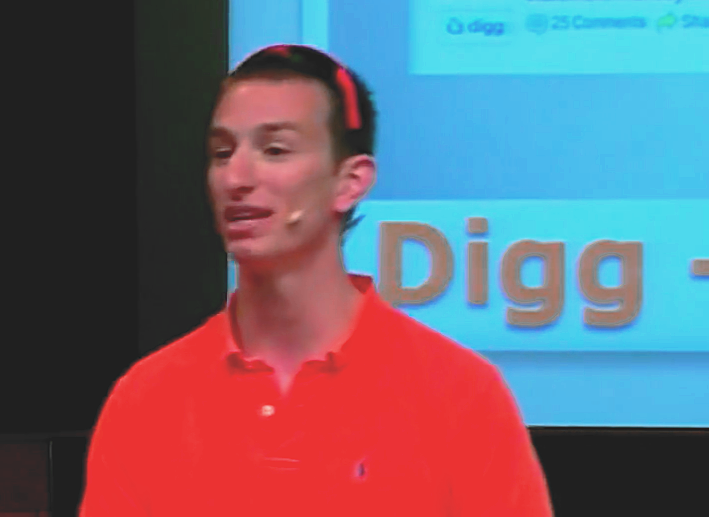The final one I want to talk about -- and it's a great one to end on --
我最后想講的是——用來結尾很好的例子是
is this concept of communal discovery,
社群探索的概念,
a dynamic in which everyone has to work together to achieve something.
人們需要一起工作來達到某個目標的動機。
And communal discovery is powerful because it leverages
社群探索有影響力的原因是因為
the network that is society to solve problems.
它能夠利用人際網絡解決各種問題。
This is used in some sort of famous consumer web stories,
它多用于著名的網上店鋪,
like Digg, which I'm sure you've all heard of.
例如Digg,我相信你們都聽說過。
Digg is a communal dynamic to try to find and source the best news, the most interesting stories.
Digg就是一個社群動力尋找最好的新聞,最有趣的故事。
And they made this into a game, initially.
起初,這就是一種游戲。
They had a leader board, where, if you recommended the best stories, you would get points.
當你推薦的某個故事上了網站首頁,你會得到加分。
And that really motivated people to find the best stories.
這激勵人們去尋找最好的故事。

But it became so powerful that there was actually a cabal,
這很有影響力,很像某種幫派,
a group of people, the top seven on the leader board,
也就是一群人,領袖榜的前七個,
who would work together to make sure they maintained that position.
他們會通力合作保證他們的位置。
And they would recommend other people's stories, and the game became more powerful than the goal.
他們會推薦彼此的故事。游戲的過程變得比目標達成的影響力更大。
And they actually had to end up shutting down the leader board because while it was effective,
最后,霸占主頁成為主要的目標,當這種情形發生時,
it was so powerful that it stopped sourcing the best stories
社群動力就會使參與者不再推薦好故事,
and started having people work to maintain their leadership.
并且,有些人開始專門為了維持領導地位忙活。
So we have to use this one carefully.
所以我們必須謹慎使用這一動機。
It's also used in things like McDonald's Monopoly,
再舉一個例子,像麥當勞大富翁游戲
where the game is not the Monopoly game you're playing,
這不像我們平常玩的大富翁游戲,
but the sort of cottage industries that form to try and find Boardwalk, right.
消費者會像尋找農舍一樣尋找濱海長堤
And now they're just looking for a little sticker that says "Boardwalk."
他們都希望找到一種有“濱海長堤”的小貼紙。
But it can also be used to find real things.
這能夠用于尋找真實存在的東西。
This is the DARPA balloon challenge,
DARPA推出了氣球挑戰賽,
where they hid a couple balloons all across the United States and said,
他們隨機在美國境內放了10個氣球,他們宣布
"Use networks. Try and find these balloons fastest, and the winner will get $40,000."
“請使用網絡,最快找到這些氣球的人會得到4萬美元獎金。”
And the winner was actually a group out of MIT,
拿走獎金的是麻省理工的一個團隊,
where they created sort of a pyramid scheme, a network,
他們制作了一個類似于老鼠會的網站,
where the first person to recommend the location of a balloon got $2,000
第一個到網站報告氣球位置的人就能拿到2000美元,
and anyone else to push that recommendation up also got a cut of it.
并且把這個消息傳給其他人就能夠分到一些。
And in 12 hours, they were able to find all these balloons, all across the country, right.
12個小時后,他們發現了境內的所有10個氣球。
Really powerful dynamic.
真的是非常有效的驅動力。
And so, I've got about 20 seconds left,
我還有20秒鐘的時間,
so if I'm going to leave you with anything,
讓我做個總結,
last decade was the decade of social.
過去的十年是網絡社交的黃金十年。
This next decade is the decade of games.
接下來的十年是游戲社交的十年。
We use game dynamics to build on it. We build with mindshare.
我們正在用這些游戲驅動力來建立。我們用的是心靈占有率。
We can influence behavior.
我們影響行為。
It is very powerful. It is very exciting.
這很有影響力,這很激動人心。
Let's all build it together, let's do it well and have fun playing.
讓我們共同打造這個游戲社交圈,讓我們一起玩游戲。











